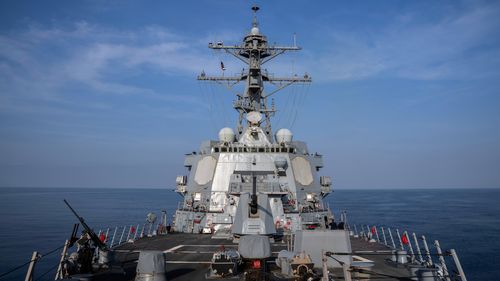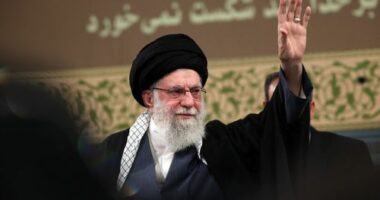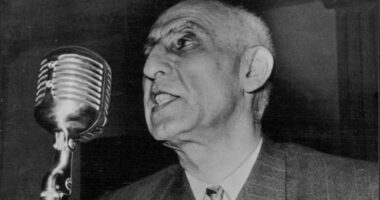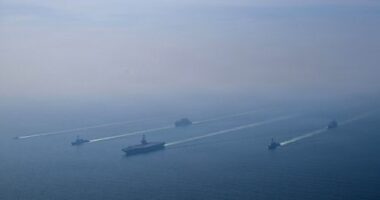Share this @internewscast.com
The USS Gravely, the USS Jason Dunham, and the USS Sampson are anticipated to reach their destination soon, noted the official, who wished to remain anonymous due to lack of authorization to speak about the matter publicly.
A representative from the Defense Department confirmed that military resources have been allocated to the area in the effort to combat narcotics traffic. This official, who similarly lacked authorization to discuss military strategies, mentioned that the ships would be stationed “over several months.”

The introduction of U.S. naval destroyers and personnel follows Trump’s initiative to involve the U.S. military in disrupting cartels he accuses of contributing to the spread of fentanyl and other illegal substances within U.S. borders, as well as exacerbating violence in some American cities.
Trump has also urged Mexican President Claudia Sheinbaum to enhance her efforts on security compared to her predecessor, particularly in the crackdown on Mexican cartels. However, she has firmly maintained the importance of Mexico’s sovereignty, refusing any proposals from Trump and others regarding U.S. military intervention.
In February, Trump’s administration classified Venezuela’s Tren de Aragua, MS-13 from El Salvador, and six other organizations in Mexico as foreign terrorist groups. His administration, led by Republicans, has also ramped up immigration enforcement against suspected gang affiliates.
Typically, this classification is reserved for entities like al-Qaida or the Islamic State group, which use violence to achieve political objectives, unlike the financially driven crime syndicates such as the Latin American cartels.
But the Trump administration argues the international connections and operations of the groups â including drug trafficking, migrant smuggling and violent pushes to extend their territory â warrant the designation.

Earlier this month, the Trump government announced it was doubling a reward for the arrest of Venezuelan President Nicolás Maduro to $50 million ($AUD77 million), accusing him of being one of the worldâs largest narco-traffickers and working with cartels to flood the U.S. with fentanyl-laced cocaine.
The press office of Venezuela’s government did not respond to a request for comment from the AP on the deployment of the destroyers.
But without mentioning the ships, Foreign Minister Yvan Gil in a statement characterised the U.S. government’s drug-trafficking accusations against Venezuela.
âWashingtonâs accusing Venezuela of drug trafficking reveals its lack of credibility and the failure of its policies in the region,â Gil said.
âWhile Washington threatens, Venezuela steadily advances in peace and sovereignty, demonstrating that true effectiveness against crime is achieved by respecting the independence of its peoples.

“Every aggressive statement confirms the inability of imperialism to subdue a free and sovereign people.â
Maduro said the U.S. had increased its threats against Venezuela and announced the planned deployment of more than 4.5 million militia members around the country.
The militias were created by then-President Hugo Chávez to incorporate volunteers who could assist the armed forces in the defence of external and domestic attacks.
âThe empire has gone mad and has renewed its threats to Venezuelaâs peace and tranquility,â Maduro said at an event in Caracas, without mentioning any specific action.
Maduro was indicted in a New York federal court in 2020, during the first Trump presidency, along with several close allies on federal charges of narco-terrorism and conspiracy to import cocaine. Back then, the U.S. offered a $15 million reward for his arrest.











